- Joined
- Feb 2, 2011
- Messages
- 2,093
NEW RELEASES FOR SEPTEMBER 2023
THE AGE OF ARTHUR
THE VIKINGS
VIKING SHIELD MAIDENS
A shield -Maiden was a female warrior from Scandinavian folklore and mythology.
They are often mentioned in Viking Sagas, and also in Germanic stories of the Goths, Cimbri and Marcomanni.
The mythical Valkyries may have been based on such shield maidens.
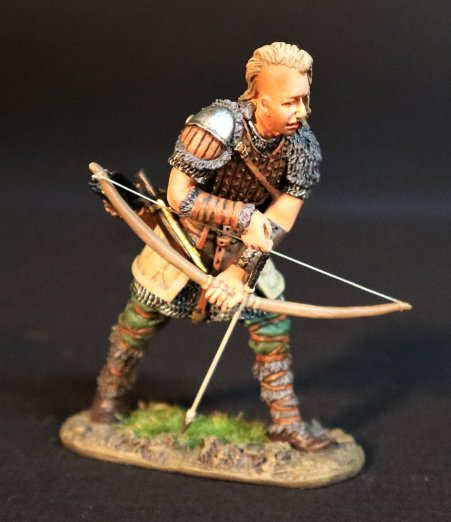
VIK-46
THE AGE OF ARTHUR,
THE VIKINGS,
VIKING SHIELD MAIDEN,
(1 pc)
There is little actual historical evidence for Viking female warriors, although there are graves of female settlers which have contained weapons.
The historical evidence that Viking Age women took part in warfare, are based on a Byzantine historian’s records that women fought in battle when Sviatoslav I of Kiev attacked the Byzantines in Bulgaria in 971 AD.
In the Siege of Dorostolon, the Varangians suffered a devastating defeat. The victors were stunned to discover armed women among the fallen warriors.
The Saxo Grammaticus, reports that shield maidens fought on the side of Danes at the Battle of Bravellir in the year 750 AD
Examples of shield maidens mentioned by name in the Norse Sagas include Brynhildr in the Volsunga Saga.
Two shield maidens appear in certain translations of the Hervarar Saga.
The first of these, whose name was Hervor, was known to have taken up typically masculine roles early in her childhood and often raided travelers in the woods dressed as a man. Later in her life, she claimed the cursed sword “Tyrfing” from her father’s burial site and became a seafaring raider. She was eventually to marry and settle down.
Her granddaughter was also named Hervor and commanded forces against the attacking Huns. Although the Saga remarks on her bravery, she was mortally wounded and dies on the battlefield.
THE NORMAN ARMY
William Duke of Normandy (c. 1028-1087), usually known as William the Conqueror was the first Norman King of England, reigning from 1066 until his death in 1087.
In the 1050’s and early 1060’s, William became a contender for the throne of England held by the Childless Edward the Confessor, his first cousin removed.
There were other claimants. Including the powerful English earl Harold Godwinson, whom Edward had named as King on his deathbed, in January 1066.
William argued that Edward had previously promised the throne to him, and that Harold had sworn to support his claim.
Throughout the summer of 1066, William assembled an army and an invasion fleet in Normandy. This force included, in addition to troops from William’s own territories of Normandy and Maine, large numbers of mercenaries, allies and volunteers from Brittany, Northeast France and Flanders.
The Battle of Hastings took place on the 14[SUP]th[/SUP] October 1066. Although the numbers on each side were about equal, William had the advantage of having both cavalry, infantry and many archers.
Harold had only foot soldiers, and few archers. The English formed a shield wall along a ridge, and were initially so effective that the invading Norman army was repeatedly thrown back with heavy casualties.
Towards the end of the day some of William’s Breton troops panicked and fled, with some of the English troops pursuing the fleeing Bretons. These English troops who had broken ranks, were themselves attacked and destroyed by the Norman mounted knights.
Norman knights were armoured warriors that fought on horseback, with lance , sword and shield. These were the Norman “secret weapon” as nothing like them had been seen before in England. There were between 1,000-2,000 Norman knights in William’s army, and it was these troops which proved decisive to the invading army’s victory.
Two further Norman retreats were feigned, which once again drew the English into pursuit and expose them to repeated attacks by the Norman cavalry.
It appears that the decisive event was Harold’s death, of which there are differing versions which are told.
William of Jumieges claimed that Harold was killed by the Duke himself.
The Bayeux tapestry shows Harold’s death by an arrow to the eye.
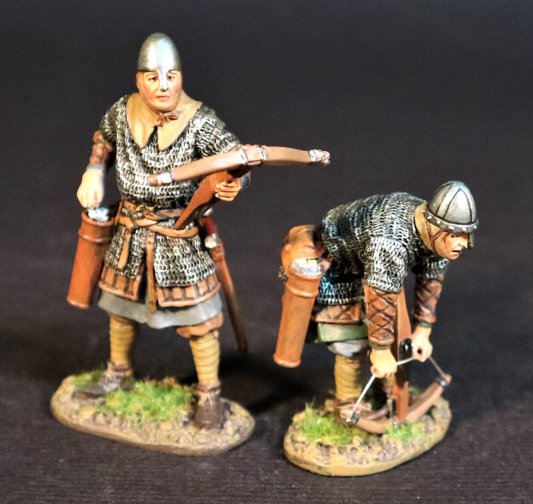
NM-39
THE AGE OF ARTHUR,
THE NORMAN ARMY,
NORMAN CROSSBOW.
(2 pcs)
THE CRUSADES
EL CID AND THE RECONQUISTA
THE SPANISH
The age in which El Cid lived has since been termed the “Reconquista”, or Christian reconquest of Spain from the Moors, and was one of the most colourful periods in military history.
The armies are spectacular and varied, ranging from the noble Christian Knights to the Muslim Andalusians, through to the religious zeal of the African invaders, the Almoravids and Almohads.
Although the period is often portrayed as a simple war of religion, it was in fact a great deal more complex, with Muslim commonly fighting Muslim, and Christian fighting Christians, with both sides using allies and mercenaries whenever it suited them.
This period, during the lifetime of El Cid 1040-1100AD saw the rise of heavy cavalry charges and other northern European influences, especially in the kingdoms of Aragon and Catalonia, which had the strongest links to France.
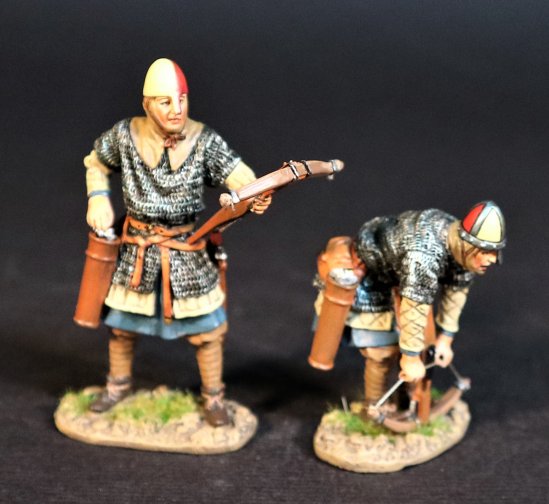
CID-19
THE CRUSADES,
EL CID AND THE RECONQUISTA,
SPANISH CROSSBOWMEN.
(2 pcs)
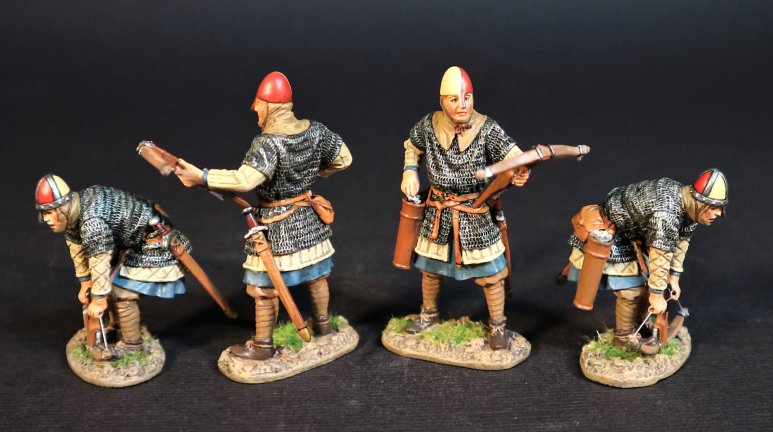
CID-19N
THE CRUSADES,
EL CID AND THE RECONQUISTA,
4 SPANISH CROSSBOWMEN
(4 pcs)
THE GREAT SIEGE OF MALTA 1565
The Great Siege of Malta occurred in 1565 when the Ottoman Empire attempted to conquer the Island of Malta, then held by the Knights Hospitaller.
The siege lasted nearly four months, from 18[SUP]th[/SUP] May to 11[SUP]th[/SUP] September 1565.
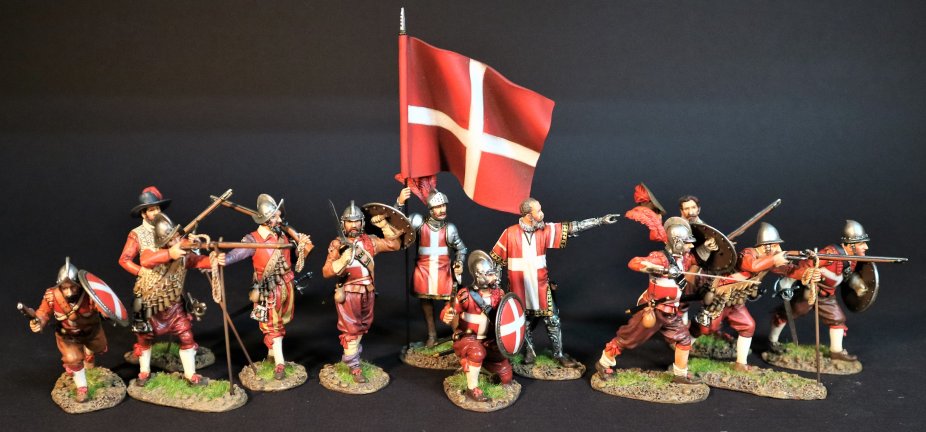
The Knights Hospitaller had been headquartered in Malta since 1530, after being driven out of Rhodes, also by the Ottomans, in 1522, following the Siege of Rhodes.
The Ottomans first attempted to take Malta in 1551 but failed. In 1565, Suleiman The Magnificent, the Ottoman Sultan, made a second attempt to take Malta.
The Knights, who numbered around 500 together with approximately 6,000 footsoldiers, withstood the siege and repelled the invaders. This victory became one of the most celebrated events of Sixteenth Century Europe, to the point that Voltaire said,
“Nothing is better known than the Siege of Malta”.
It undoubtedly contributed to the eventual erosion of the European perception of Ottoman invincibility, although the Mediterranean continued to be contested between Christian coalitions and the Muslim Turks for many years.
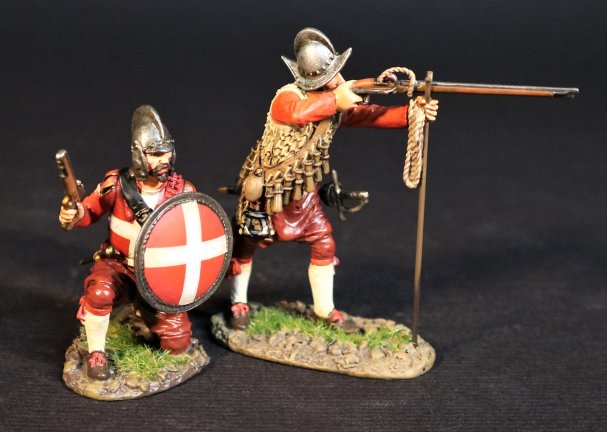
MALT-07
THE CRUSADES,
THE GREAT SIEGE OF MALTA 1565,
MALTESE MILITIA.
(2 pcs)
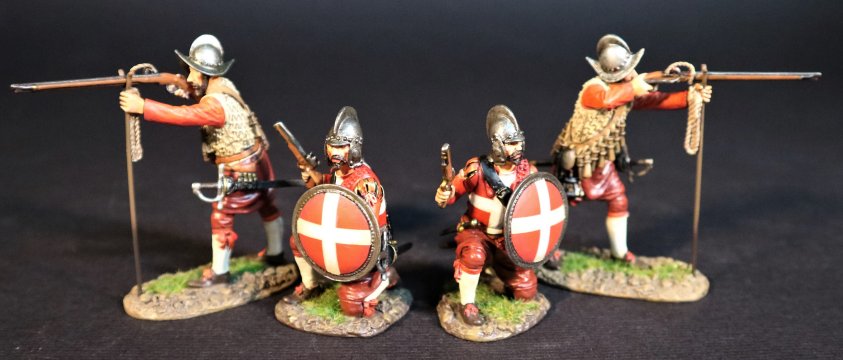
MALT-07N
THE CRUSADES,
THE GREAT SIEGE OF MALTA 1565,
4 MALTESE MILITIA.
(4 pcs)
** PLEASE CONTACT YOUR LOCAL DEALER FOR FURTHER INFORMATION **
THE AGE OF ARTHUR
THE VIKINGS
VIKING SHIELD MAIDENS
A shield -Maiden was a female warrior from Scandinavian folklore and mythology.
They are often mentioned in Viking Sagas, and also in Germanic stories of the Goths, Cimbri and Marcomanni.
The mythical Valkyries may have been based on such shield maidens.

VIK-46
THE AGE OF ARTHUR,
THE VIKINGS,
VIKING SHIELD MAIDEN,
(1 pc)
There is little actual historical evidence for Viking female warriors, although there are graves of female settlers which have contained weapons.
The historical evidence that Viking Age women took part in warfare, are based on a Byzantine historian’s records that women fought in battle when Sviatoslav I of Kiev attacked the Byzantines in Bulgaria in 971 AD.
In the Siege of Dorostolon, the Varangians suffered a devastating defeat. The victors were stunned to discover armed women among the fallen warriors.
The Saxo Grammaticus, reports that shield maidens fought on the side of Danes at the Battle of Bravellir in the year 750 AD
Examples of shield maidens mentioned by name in the Norse Sagas include Brynhildr in the Volsunga Saga.
Two shield maidens appear in certain translations of the Hervarar Saga.
The first of these, whose name was Hervor, was known to have taken up typically masculine roles early in her childhood and often raided travelers in the woods dressed as a man. Later in her life, she claimed the cursed sword “Tyrfing” from her father’s burial site and became a seafaring raider. She was eventually to marry and settle down.
Her granddaughter was also named Hervor and commanded forces against the attacking Huns. Although the Saga remarks on her bravery, she was mortally wounded and dies on the battlefield.
THE NORMAN ARMY
William Duke of Normandy (c. 1028-1087), usually known as William the Conqueror was the first Norman King of England, reigning from 1066 until his death in 1087.
In the 1050’s and early 1060’s, William became a contender for the throne of England held by the Childless Edward the Confessor, his first cousin removed.
There were other claimants. Including the powerful English earl Harold Godwinson, whom Edward had named as King on his deathbed, in January 1066.
William argued that Edward had previously promised the throne to him, and that Harold had sworn to support his claim.
Throughout the summer of 1066, William assembled an army and an invasion fleet in Normandy. This force included, in addition to troops from William’s own territories of Normandy and Maine, large numbers of mercenaries, allies and volunteers from Brittany, Northeast France and Flanders.
The Battle of Hastings took place on the 14[SUP]th[/SUP] October 1066. Although the numbers on each side were about equal, William had the advantage of having both cavalry, infantry and many archers.
Harold had only foot soldiers, and few archers. The English formed a shield wall along a ridge, and were initially so effective that the invading Norman army was repeatedly thrown back with heavy casualties.
Towards the end of the day some of William’s Breton troops panicked and fled, with some of the English troops pursuing the fleeing Bretons. These English troops who had broken ranks, were themselves attacked and destroyed by the Norman mounted knights.
Norman knights were armoured warriors that fought on horseback, with lance , sword and shield. These were the Norman “secret weapon” as nothing like them had been seen before in England. There were between 1,000-2,000 Norman knights in William’s army, and it was these troops which proved decisive to the invading army’s victory.
Two further Norman retreats were feigned, which once again drew the English into pursuit and expose them to repeated attacks by the Norman cavalry.
It appears that the decisive event was Harold’s death, of which there are differing versions which are told.
William of Jumieges claimed that Harold was killed by the Duke himself.
The Bayeux tapestry shows Harold’s death by an arrow to the eye.

NM-39
THE AGE OF ARTHUR,
THE NORMAN ARMY,
NORMAN CROSSBOW.
(2 pcs)
THE CRUSADES
EL CID AND THE RECONQUISTA
THE SPANISH
The age in which El Cid lived has since been termed the “Reconquista”, or Christian reconquest of Spain from the Moors, and was one of the most colourful periods in military history.
The armies are spectacular and varied, ranging from the noble Christian Knights to the Muslim Andalusians, through to the religious zeal of the African invaders, the Almoravids and Almohads.
Although the period is often portrayed as a simple war of religion, it was in fact a great deal more complex, with Muslim commonly fighting Muslim, and Christian fighting Christians, with both sides using allies and mercenaries whenever it suited them.
This period, during the lifetime of El Cid 1040-1100AD saw the rise of heavy cavalry charges and other northern European influences, especially in the kingdoms of Aragon and Catalonia, which had the strongest links to France.

CID-19
THE CRUSADES,
EL CID AND THE RECONQUISTA,
SPANISH CROSSBOWMEN.
(2 pcs)

CID-19N
THE CRUSADES,
EL CID AND THE RECONQUISTA,
4 SPANISH CROSSBOWMEN
(4 pcs)
THE GREAT SIEGE OF MALTA 1565
The Great Siege of Malta occurred in 1565 when the Ottoman Empire attempted to conquer the Island of Malta, then held by the Knights Hospitaller.
The siege lasted nearly four months, from 18[SUP]th[/SUP] May to 11[SUP]th[/SUP] September 1565.

The Knights Hospitaller had been headquartered in Malta since 1530, after being driven out of Rhodes, also by the Ottomans, in 1522, following the Siege of Rhodes.
The Ottomans first attempted to take Malta in 1551 but failed. In 1565, Suleiman The Magnificent, the Ottoman Sultan, made a second attempt to take Malta.
The Knights, who numbered around 500 together with approximately 6,000 footsoldiers, withstood the siege and repelled the invaders. This victory became one of the most celebrated events of Sixteenth Century Europe, to the point that Voltaire said,
“Nothing is better known than the Siege of Malta”.
It undoubtedly contributed to the eventual erosion of the European perception of Ottoman invincibility, although the Mediterranean continued to be contested between Christian coalitions and the Muslim Turks for many years.

MALT-07
THE CRUSADES,
THE GREAT SIEGE OF MALTA 1565,
MALTESE MILITIA.
(2 pcs)

MALT-07N
THE CRUSADES,
THE GREAT SIEGE OF MALTA 1565,
4 MALTESE MILITIA.
(4 pcs)
** PLEASE CONTACT YOUR LOCAL DEALER FOR FURTHER INFORMATION **

